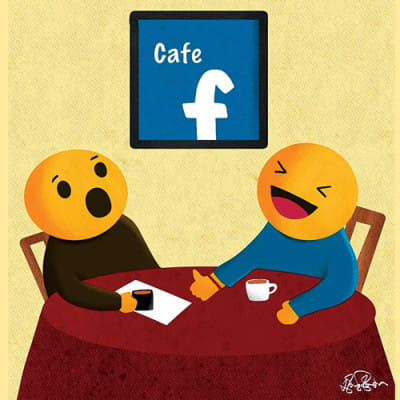The internet is making us less informed and more opinionated

In today's world, information knows no bounds thanks to the internet. However, does this accessibility to information lead directly to an individual becoming more informed? Are we open to ideas or opinions beyond, or contrasting to, our own ones?
The internet has vastly improved networking. Nonetheless, people tend to socialise with individuals who reiterate their own thinking patterns. This is creating more and more echo chambers while strengthening existing ones.
An echo chamber may be a social media group, the pages followed, or even an individual's entire feed. The more you interact, the louder the echo becomes. This happens because social media platforms are designed to keep the user hooked for as long as possible. And what can be better bait for you than content you have already shown an affinity for?
Social media platforms run on sophisticated algorithms to customise your feed by shuffling content you are most likely to click. The more clicks, the longer you engage, and greater profits come their way. While this means you end up procrastinating more, there are benefits like getting the latest updates about the stuff you need (or like) without having to search for it.
Echo chambers might form with, for example, a preferred luxury brand, someone's favourite musician, or even with news outlets espousing specific cultural and religious sentiments. The latter may consist of misconstrued images of real-life occurrences and incidents that can create and embolden dividing beliefs. Digital deduction is a term defining the increasing reliance on a handful of resources over the internet to reach a quick conclusion. And often echo chambers form that handful of resources.
An often-heard criticism of traditional media is that it's either partial, or at least heavily influenced by establishment powers like governments or big businesses. Hence, many have turned to Facebook, Twitter, and Instagram for a "better" understanding of a reported incident, forgetting that social media is not free of all forms of prejudice.
With more and more people expressing their opinions, echo chambers are becoming a critical aspect in turning a kindle into fire. It's important to mention here that while voicing one's opinion isn't a problem, but statements meant to divide people and rile up sentiments are. This problem worsens with human nature being such that negative emotions, like fear and anger, are more contagious than positive ones like joy and relief. Violent and segregating emotions are likely to garner more attention.
Echo chambers are unsurpassed at generating confirmation biases. A confirmation bias occurs when the brain is tuned to assimilate ideas or opinions agreeing to a person's preconceived notions while rejecting anything contradictory. Consequently, the echo chamber becomes a bubble beyond which everything else is a lie.
So, which is worse? Being uninformed, or misinformed? Dogmatic views are a deluge over the internet. Critically consuming content is probably this century's most crucial competence. The upshot is that yes, every person has an opinion and is free to voice it but this should not impair one's ability to form educated opinions.
Riyana is an introvert self-debating on whether she is an INFJ or INFP. Send her memes on introversion and MBTI personality tests on Instagram at _raya_riyana_

 For all latest news, follow The Daily Star's Google News channel.
For all latest news, follow The Daily Star's Google News channel. 



Comments